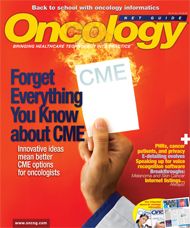Publication
Article
4 Questions... with Doug Farrago, MD, of the Placebo Journal
Doug Farrago, MD, is a full-time practicing physician in Auburn, ME, and the founder of the Placebo Journal (www.placebojournal.com), which is meant to â��empower physicians with a skill that is sorely lacking â�" humor.â��
1 What made you decide to produce a magazine about medical humor?
Doctors deal in tragedy and loss all the time, and the only thing that made me survive was talking to my friends and my partners; we’d tell self-deprecating stories about some of the crazy, funny stuff that goes on and crack each other up. I realized that everybody in the medical field needs this.
It’s a very tough thing; you can’t let your guard down as a physician. Patients don’t want us to be gods, which we are obviously not, but we can’t become too human either because it’s unprofessional. So it becomes this continual confl ict where you see bad things happen and need a thick skin to deal with the trauma, but what happens is that after so much time, we desensitize and become these robo-docs that no one wants to hang out with. We need something to lighten us up.
2 You often talk about pharmaceutical companies. How do you think physicians reconcile the need for pharmaceutical companies along with their disdain for them?
I absolutely respect the pharmaceutical industry, and research is dependent upon the way the system is set up. But when they do some ridiculous stuff —like some of their ads on TV—someone has to corral them in. We have in the journal “Stupid Pharmaceutical Tricks,” where we make fun of the most ridiculous things every month, like a little miniature recliner for your cell phone that says the drug’s name on it; who the hell wants this stuff ? It’s interesting, because I can never put advertising in my journal. It was a distinct choice to do that; now we don’t have to worry about compromising our editorial conscience.
I was also off ered the chance to do a comedic XM radio show for doctors. I gave them a sample, and they said “Hey, that’s great, but can you do it without teasing pharmaceuticals and doctors?” So I said, “Ok, I’m out!” They don’t get it. I think doctors believe that some magazines and journals are a bit bought off by pharmaceuticals, and that was a perfect example. Th is great new radio station just for doctors wouldn’t have me on because I was going to tease pharmaceuticals. Th at just perpetuates that mindset.
3 Do you see yourself having plenty of fodder for as long as you continue to do this?
It’s no problem coming up with stories; the main subject matter of the journal consists of real patients, real doctors, and
real administrative stories that happen, and they always come in. The rest is parody, and let me tell you something: this is the easiest thing in the world. In the last issue, we did a parody on all the electronic prescription services. We called it “easy cans,” which consisted of a metal can connected to your pharmacy with a string; it’s just too easy. We’ll never run out of material,
because there are too many people trying to mess with medicine and who think they have all the answers.
4 You patented the Knee Saver, a staple amongst gardeners, maintenance workers, and Major League catchers; when did you come up with this?
In the late ‘80s I blew my left knee out; it was never the same, and I couldn’t squat. I remember working on a light socket and squatting down, and it was killing me, so I put some towels behind my leg, and that was it. I went to work thinking, “This is great. Who squats all the time?” And it went from there. It was only a couple years before I got the patent, but it took from ’91 to ’97 until I got the first player, Sandy Alomar, to wear it. It took so long because of the change in mindset from the tradition—it’s kind of like what I did with the Placebo Journal, adding humor to the medical profession; there are incredible parallels. Let’s go with baseball, which is a traditional sport— there had been no new equipment in baseball for a long time. It takes a lot of years to convince enough people that this is actually worth it; that’s the exact parallel.
